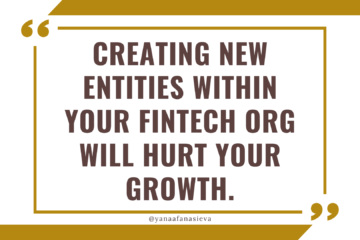What is Happening With European FinTech Hubs and Where Should You Bring Your Global FinTech Services?
This question comes up again and again. Somehow, people feel that there must be this promised golden-plated land where regulators are amicable and fast and flexible, services are affordable, everyone speaks and works in English, there is no bureaucracy, and licenses are granted next week with no questions asked.
Many countries have pros and cons, and it’s always great to operate in a country where there is a pre-existing FinTech business ecosystem, and where decision-makers understand your business model and are familiar with your technology.
However, trying to search for the perfect, the best, the most suitable jurisdiction and expecting that you would not face any challenges and delays is a BROKEN STRATEGY.
Instead, it makes more sense to assess the relativity of various factors and whether those factors are lasting or can disappear overnight.
Here are some thoughts on this.
Lasting factors:
- Several serious, profitably growing, fairly mature startups from your field (or even some multinational industry leaders) continuously operate from this country, keep their head office there, and don’t jump all over Europe searching for alternative jurisdictions.
- Founders who operated in that country before decided to launch their next startup from the same country.
- It is known and verifiable that it is possible to secure banking relationships and corporate partnerships for FinTech startups in this country.
- A national regulator is not known to take “publicity stances”, issue PR-driven warnings or bans, or start prosecutions and litigations against various industry players, asset categories, or types of activities. National regulator understands that financial systems are interconnected and global and that not everybody who operates outside of their country is inferior.
Non-lasting factors:
- The regulator has granted an exception or special permission to your competitors.
- This country has a special licensing regime for crypto businesses that is easier than in other countries (it can help short-term, but is irrelevant in Europe long-term because MICA Regulation is coming).
- This country has a more “lax” simplified due diligence regime (because the next AMLD 7/8/9 can overrule it).
- There are government officials from this country presenting at every conference or FinTech event in the region talking about how progressive and welcoming their country is towards FinTech. This is irrelevant because the teams working on the license application reviews and subsequent supervisory reviews of your entities are VERY DIFFERENT from the people who work in FinTech labs or regulatory promotion departments.
- This country has granted 300+ licenses of a certain kind in the last 30 days. This is not economically sustainable or credible, and most likely many of those companies will never become operational or will lose their licenses very quickly.
In summary, new laws come into force, people who work at the regulatory bodies change, and one scandal can kill a lot of opportunities or exceptions. Your ability to stay in your lane, be consistent, continue the regulatory dialog, and prepare arguments to support your case are much more important for successful license applications and play a much bigger role compared to those initial “lay of the land” factors that you cannot change anyway.
Noteworthy regulatory trends and events in recent months:
- Exceptionally long licensing review times in Ireland, the UK, Luxembourg, Netherlands, and Singapore. Many companies nevertheless seek to license there because it opens doors to banking relationships, partnerships, and funding.
- More and more tokenization projects in Liechtenstein. In fact, Liechtenstein is probably one of the very few regulators in Europe who does not need to re-write their VASP regulatory regimes rules post-FTX, because they already had crypto funds segregation requirements and own fund capital requirements for VASPs since 2019.
- In fact, the tokenization of assets and reinvention of stablecoins is a thing.
- Hong Kong launched its new VASP regulatory regime in 2023.
- More friction in more countries. Several open litigations and public disputes of a number of FinTech companies against the DNB over AML rules simplified due diligence regimes and technical proof of ownership for private wallets. A number of FinTech and crypto startups are experiencing regulatory frictions in Estonia, Bulgaria, and Poland and consider their existing strategies.
- Lithuanian BoL has already been very discerning with their EMIs. In the last months, they issued a number of additional requirements for local VASPs, making it more difficult and expensive to register and operate a crypto business out of Lithuania. A number of new requirements with respect to local MLRO and minimum capital requirements came into force in November 2022, and a number of new AML requirements are applicable from February 1st, 2023.
I was also asked a lot where FinTechs should assign “international” (meaning non-US) customers.
If you think about it, most FinTechs who want to serve global markets usually have the US entity to serve North America and the EU entity. But what about Asia, Africa, the Middle East, and LatAm? They are not always big enough and very segmented, so is it better to serve them from the US or from a European legal entity?
My answer is – from Europe, hands down.
Here is why Europe is better:
- Your customers will be able to enjoy a European level of security, fraud protection, privacy, and consumer rights – which is arguably the best in the world, so your message for the local customers and local partners is stronger.
- If you serve non-US residents in the US, as a financial institution you will have to collect a lot more information about your international customers and you would have to report it to various US authorities. First – it’s cumbersome. Second – not all people from Asia, Russia, the Middle East, or LatAm would be happy about it.
- It’s easier to open bank accounts and secure international banking relationships to send money from Europe to Asia or Africa, compared to doing it from the US. The US financial system is very inflexible when it comes to settlements in anything but USD.
What has been your experience? Any other considerations?
Enjoy listening to podcasts instead of reading? – Tune in to this episode here!






